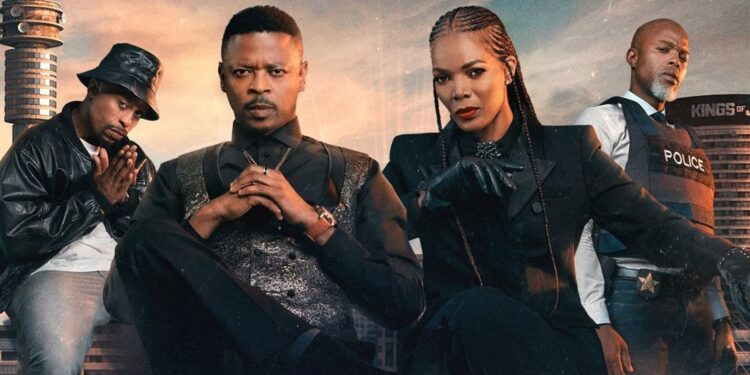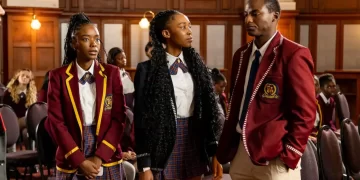Kings of Jo’burg season one starts us off with a montage of an interview where a journalist berates an officer about their inability to stop crimes within the streets of Johannesburg, a man hitchhiking shortly after being released from a 10-year jail sentence, and a robbery in progress being methodically executed by a gang before a man switches from a luxurious car into another, casually walks behind them, and appears to walk away with the loot without so much as making contact with the rest of the robbers, before switching back to his original car after a demonic reveal. That montage, brief and convoluted as it is, sums up the entire series in every way.
The South African crime drama, which first premiered on Netflix in 2019, recently released its second season to continue the story of Mo, played by Zolisa Xaluva (Gomora), as he navigates life after spending 10 years in prison for his family’s criminal enterprises, trying to balance the blossoming love with Phumzi (Cindy Mahlangu, Blood and Water), and the prospect of a clean start with his dangerous incline toward his brother Simon (played by creator and showrunner Shona Ferguson, now deceased) and their family’s empire built on crime.
It’s safe to say that you know Kings of Jo’burg long before you begin watching it. The series is filled with all the clichés and tropes that define the genre, everything that any good show would try to steer clear of. Punching their way into a story that has been told to exhaustion at this point, Kings of Jo’burg lacks even well-directed action, great acting, memorable lines, or even a good love story, or any of the other excuses crime shows of this nature have for being blunt, forgettable, and lacklustre. Everything about it, and I mean everything, feels lacking in some way or form. The show paces from a family drama filled with tortured dialogue and misconstrued emotion that makes the worst soap opera feel like good company to an action crime drama that feels like a pre-pubescent fantasy of what a child would perceive the underground criminal landscape to be like.
There are whole scenes and sometimes episodes that feel like utilitarian placeholders where better versions would go if the creative team cared about them nearly as much as they should. But they didn’t. They went about writing, bringing together all the cast and crew, directing, and eventually editing what, in my opinion, should never have seen the light of day, at least not in the condition it was released.
In the spirit of the opening montage, the first season finds our main character, Mo, lacking in both motivation and any real sense of resolve, tiptoeing from an insufferable plea for his changed life to finding himself back in his criminal ways without so much as a push. He meets tragedy early in his short stint out of jail, which is set up as the inciting factor to unlock the beast inside, yet its effect barely lasts a whole episode. His love for Phumzi, apparently the cause of his change, grows and connects in the background for the most part, giving the audience no reason to care for either of them—and that’s before convoluted plot twists are added to the mix.
That’s Mo’s story in a nutshell. His rich, affluent brother is the king and father of the criminals, and with such a crown comes internal demons, both metaphorical and otherwise. He and all the other criminal lords are all cut from the same cloth: muscled men in good-looking suits, a cigar or whiskey in hand, and a limited vocabulary, glittered with cursive to show their machismo. They go about doing robbery missions that have no bearing on the narrative other than an excuse to quantify their wealth while filling the run time. And then there are the police, who are just sloppy. By the end of the first season, especially in the last episode, one has every right to feel completely confused and underwhelmed, with only the hope that any future season would retrieve what is supposed to be an interesting story out of this muddled mess.
The second season gets a new showrunner in Shona Ferguson’s widow, Connie Ferguson, and Samad Davis to continue the show after Shona’s passing in 2021 due to COVID-19 complications. As Simon, Shona was integral to Kings of Jo’burg’s story, which continues in the same vein in the second season, albeit with two extra episodes. The same trend of poorly paced scenes that could cause vertigo and poorly written dialogue that betrays any real emotion from the characters. New and old characters walk in and out of the narrative at the leisure of story beats without causing any lasting impact on the status quo other than a timely exclamation to offer a cliffhanger for the end of the episode. I could go into the plot lines, but I barely remember them, even though I just finished the show an hour ago. All I remember are many moments where I felt like punching the television off the wall. By the end of it, I had gone through a rollercoaster of emotions, which is always appreciated when the emotions aren’t exclusively rage, disgust, embarrassment, and pity.
I could go on expressing the many many things I didn’t like about Kings of Jo’burg, especially since I will never get back the ten hours it has taken away from my life, but I have to conclude at some point. It’s a bland, one-dimensional drama that joins Netflix’s growing collection of forgettable original programming that continues to kill whatever brain cells we still have left. The company doesn’t need any more badly choreographed action dramas or badly written soap operas ready to wander off into obscurity the moment they air. It needs something sharp, new, daring, but above all, grounded. It’s not impossible, to say the least. Peaky Blinders or our own Pepeta (which we reviewed here) come to mind. And since we won’t be sharing passwords anymore, they’ll need it soon, but it’s unlikely they’ll find it digging in the same pit.
Kings of Jo’burg S1 and S2 is available to stream on Netflix.
Enjoyed this article?
To receive the latest updates from Sinema Focus directly to your inbox, subscribe now.











